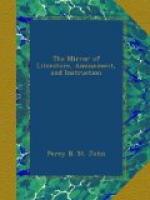* * * * *
ROMAN THEATRES.
There are five theatres at Rome to a population very nearly as considerable as that of Dublin. Each of these establishments is the property of one of the noble families in the city, who prefer doing by themselves what is usually done in England by committee.
* * * * *
CATS AND FELINE ANIMALS (once more!)
Animals of the cat kind are, in a state of nature almost continually in action both by night and by day. They either walk, creep, or advance rapidly by prodigious bounds; but they seldom run, owing, it is believed, to the extreme flexibility of their limbs and vertebral column, which cannot preserve the rigidity necessary to that species of movement. Their sense of sight, especially during twilight, is acute; their hearing very perfect, and their perception of smell less so than in the dog tribe. Their most obtuse sense is that of taste; the lingual nerve in the lion, according to Des Moulins, being no larger than that of a middle-sized dog. In fact, the tongue of these animals is as much an organ of mastication as of taste; its sharp and horny points, inclined backwards, being used for tearing away the softer parts of the animal substances on which they prey. The perception of touch is said to reside very delicately in the small bulbs at the base of the mustachios.—Wilson’s Zoology.
* * * * *
TEA AND TAY.
From Blackwood’s last “Noctes."
North. As you love me, my dear James, call it not tea, but tay. That though obsolete, is the classical pronunciation. Thus Pope sings in the Rape of the Lock, canto i.
“Soft yielding minds to water glide
away,
And sip with nymphs their elemental tea.”
And also in canto iii—
“Where thou great Anna, whom these
realms obey,
Dost sometimes counsel take, and sometimes
tea.”
And finally in the Basset Table—
“Tell, tell your grief, attentive
will I stay,
Though time is precious, and I want some
tea.”
Shepherd. A body might think frae thae rhymes, that Pop had been an Eerishman.
* * * * *
“MERRY ENGLAND.”
The people of England, we fear, have at last forfeited the proud title of “merry,” to distinguish them from other and less happy, because more serious, nations; for now they sadden at amusement, and sicken and turn pale at a jest; so entirely have they forfeited it, that an ingenious critic cannot believe they ever possessed it; and has set himself accordingly to prove, that, in the old English, merrie does not mean merry, but sorrowful, or heart-broken, or some such thing.—Edin. Rev.




